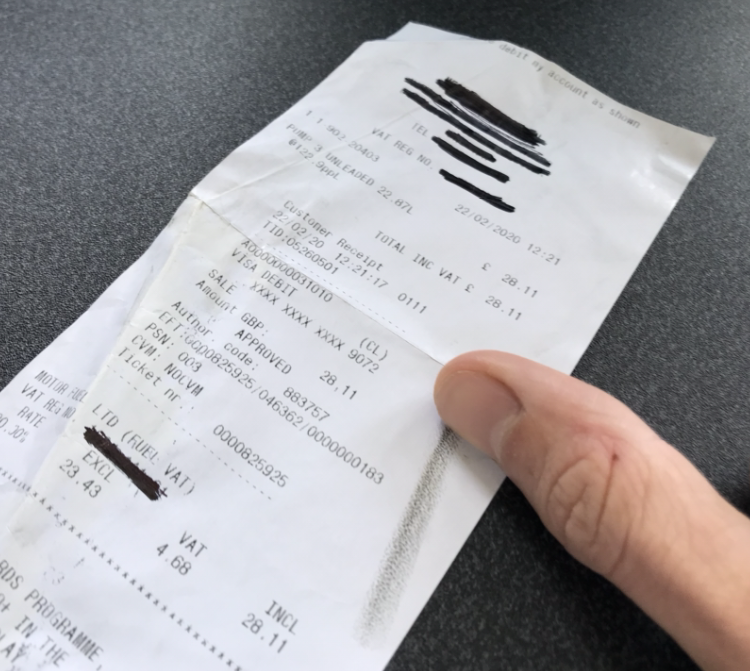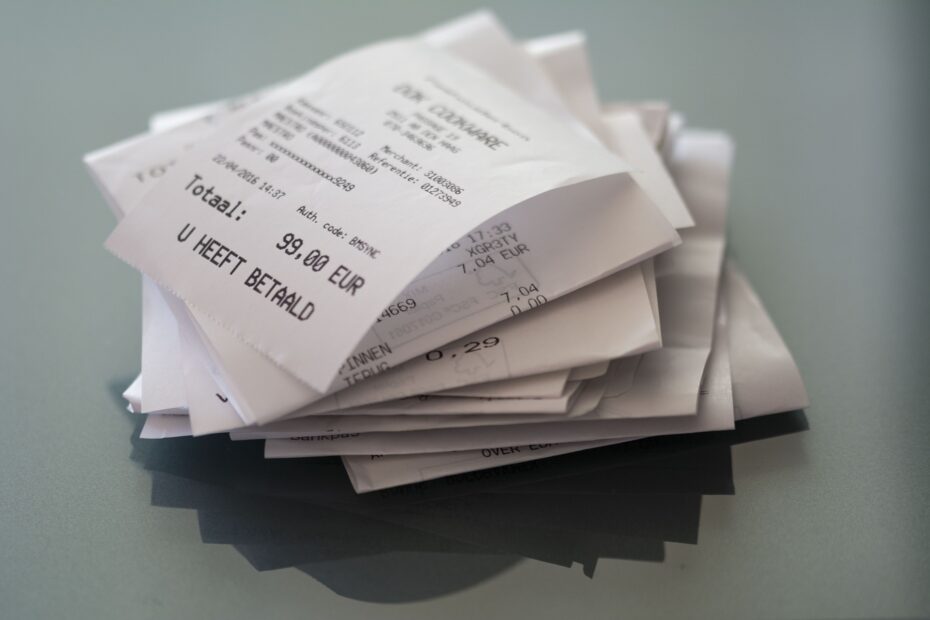Many areas require you to keep thermal paper out of the recycling. Check with your local waste collector to see if they have alternatives in place. If in doubt, keep unwanted receipts out of the recycling bin.
Most likely the receipts are printed on thermal paper, best practice is to bin them!
It seems a little counter-intuitive as it’s paper, I know. Trust me though, until an alternative becomes the new normal its best not to recycle your unwanted receipts but send them to the landfill instead.
Why Not Recycle Unwanted Receipts?
The reason why most receipts can’t be recycled is due to their composition. Receipts used in shops or restaurants are likely printed on thermal paper. Meaning, instead of using ink, chemicals in the thermal paper react with heat in order to display the required text. The paper has thermal properties because they are coated in chemicals such as BPA, or an alternative BPS.
During the recycling process, thermal paper can contaminate products made from recycled goods. This is why it’s so important not to recycle your unwanted receipts. By keeping receipts out of the recycling bin this reduces BPA found in our recycled products like toilet paper and cardboard to a minimal and perfectly safe amount. Sadly, composting receipts will also contaminate your soil. The best thing is to send them to landfill.
How Do I Know It’s A Thermal Paper Receipt?

Thermal receipts have a plastic shine and smoothness to them. A quick test is to run your fingernail firmly across the paper, it will leave a mark if it’s thermal paper.
Alternative receipt paper, like those used in printed receipts systems. Where an ink cartridge or ribbon is required, can be recycled. Bear in mind, a global study published in 2018 found that between 2010-2017 on average 93% of receipts were printed on thermal paper containing BPA.
Do not recycle unwanted receipts if you are uncertain. The safest bet is to send it to the landfill instead. This way, the receipt will not contribute towards the contamination of other recycled goods.
Why Do Shops Use Thermal Paper Receipts?
By using a thermal printer shops don’t need to purchase separate ink and till rolls. Currently, the market is biased towards thermal printers. Which has fewer consumables and moving parts compared to their counterpart, a printed receipt system. Thermal receipts have cost and convenience going for them which is the reason behind their widespread use.
What Is BPA?
Bisphenol A (BPA) is a chemical compound that has seen industrial use since the 1960s. Mainly used in combination with other chemicals in the manufacture of plastics and resins. One example is polycarbonate plastics, often used in containers that store food and beverages, such as water bottles. Another example is epoxy resins, the inner coating of tin cans to stop the product from adopting a metallic taste.
In this report published in 2010, several US government bodies found that BPA is a reproductive, developmental, and systemic toxicant in animal studies. Concerns are that excessive exposure to humans poses adverse health effects, which include endocrine-disrupting properties, affecting a person’s reproductive capabilities.
Should You Be Worried About BPA?
Common consumer goods containing endocrine-disrupting properties all sounds pretty scary, but before you throw away anything with a hint of BPA in the bin, read this. The most up to date and comprehensive re-evaluation of BPA exposure and toxicity was published by the European Food Safety Authority in 2015. Their conclusion was that products containing BPA pose no health risk to consumers of any age group. Exposure to BPA from a combination of sources is considerably under the safe level (TDI*). To put that into perspective, the study finds that daily exposure from various sources (e.g. diet, polycarbonate bottles, thermal paper, etc) is 3-5 times lower than the TDI*.
*(Tolerable Daily Intake) TDI is an estimate of the amount of a substance (expressed on a body weight basis) that can be ingested daily over a lifetime without appreciable risk.
Avoiding all traces of BPA in modern society is near impossible, but as we become more aware of the issues and more alternatives become available on the market we can hopefully move away from the industrial uses of BPA. The main point to remember and act upon is to not recycle your unwanted thermal receipts.
What is being done about BPA?
- In December 2016, the European Commission published a new regulation restricting the use of Bisphenol A (BPA) in thermal paper in the EU. After January 2020, thermal paper which contains BPA in a concentration equal to or more than 0.02% by weight will be banned from the EU
- In February 2018, the EU introduced stricter limits on BPA in food contact materials, derived from the temporary tolerable daily intake set by EFSA in 2015.
- Research is having an impact; some retailers have begun introducing receipts that are BPA and BPS-free, by using recycled paper certified by the Royal Society of Conservation.
- Many countries have banned the use of BPA in various products, including infants feeding bottles.
If you’re interested in learning more about BPA then more current information can be found here.
How Can I Avoid Receipts?
Reducing the number of receipts that you collect in the first place further encourages suppliers to back alternatives.
Many companies are beginning to offer paperless e-receipts as an option. Personally, it’s great for if I ever need to return an item and easy to manage by simply creating a folder in your email specifically for electronic receipts.
In other cases, ask yourself if you really need a receipt? We have all done it, bought a cheeky snack then before you know it your unconsciously stuffing receipts in your back pocket. Just simply state you don’t need a receipt if you deem it to be unnecessary. In most cases, the business is obliged to provide proof of purchase so one may be printed anyway.
Another option is to use an app like Apple Pay, or a similar alternative on your smartphone. Provided it’s in a store that accepts contactless payments and you spend less than £30. One tap, and you get a digital confirmation of your purchase.
The best way to reduce your receipts and the solution to a lot of current global issues, is to simply shop less, buy what you need when you need it.
Some retailers are turning towards companies like Flux, they are able to deliver digital receipts to your banking app. Super convenient and (fingers crossed) the near future, but Flux isn’t alone. Many other companies are beginning to offer alternative methods. Major retailers like Argos, Topshop, and Urban Outfitters offering customers the opportunity to have a receipt emailed to them at checkout. Digital services rely heavily on e-receipts or in-app invoices, for example, companies like Uber.
Conclusion
Thermal receipts are widespread and deemed perfectly safe. Regardless, they are still non-recyclable, consume oil, trees, water, and are counterintuitive to the digital lifestyle we currently have. So next time your wallet, purse, or back pockets are full of receipts, send those unwanted receipts to the landfill.
Could thermal paper receipts be the next plastic straw? After all, a popular campaign on a relatively small environmental issue helped to turn the tide against plastic straws. It showed us we have a voice, and how changing attitudes can shift organizations influence towards change.

I am regular reader, how are you everybody? This post is in fact pleasant. Nani Salmon
Glad you enjoyed it Nani, we are well thankyou here at Green Rev. More posts coming soon…..
Loved your stylish authored material!
Comments are closed.